[box]Despite our advancement in nutritional science, the same old nutritional health myths are as prevalent as ever.[/box]
While some of these health myths are finally being addressed, others are still considered gospel to health professionals. Proving that no matter how far we go with our scientific research, there will also be misinformation out there, and people will believe it.
We will explore the 9 top health myths that still exist today and back them up with science. A novel idea, no?
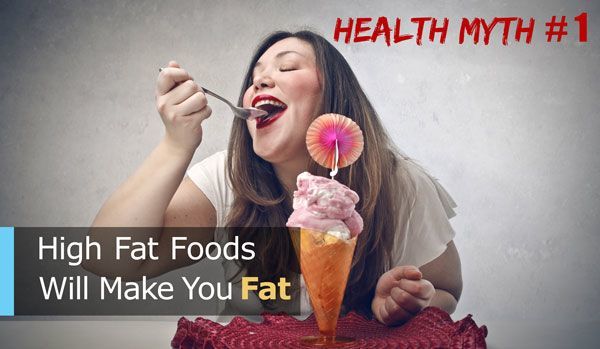
Myth #1: Eating Fatty Foods Will Make You Fat
In order to lose weight, you need to avoid eating foods high in fat.
While this can be true, it depends entirely on the type of fats being consumed and the amount of carbohydrates in your diet.
The fact is, high fat diets that are low in carbs actually lead to increased weight loss compared to low-fat diets. This stood true even when the low-fat diet groups restricted their calorie intake. [1,2]
The Bottom Line: Healthy fats can not only improve weight loss efforts, they are extremely healthy. Helping to improve our cellular health and function, cognitive health and much more.
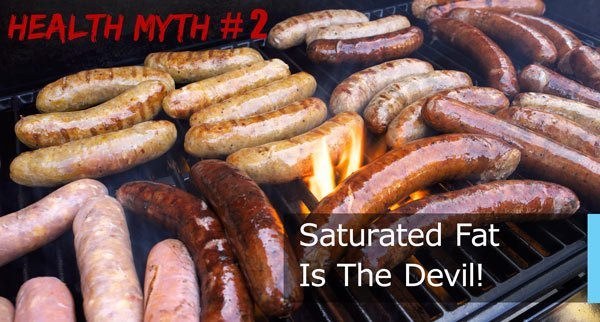
Myth #2: Saturated Fat Is The Devil
A fact that has been touted for decades and is the basis for our modern dietary guidelines; saturated fat is evil, it raises cholesterol and is the cause of heart disease.
This monstrous health myth has been debunked by multiple review studies. These studies not only prove that saturated fat is not linked to an increased risk of heart disease and stroke, but these fats are actually healthy, improving cholesterol levels. [3,4]
Not only is saturated fat not the devil, it is actually a part of a healthy diet when consumed in moderation. Helping to raise your HDL “good” cholesterol and reducing our risk of heart disease. [5,6]
The Bottom Line: Eating saturated fats does not increase the risk of heart disease or stroke. When consumed in moderation these fats are actually quite healthy.
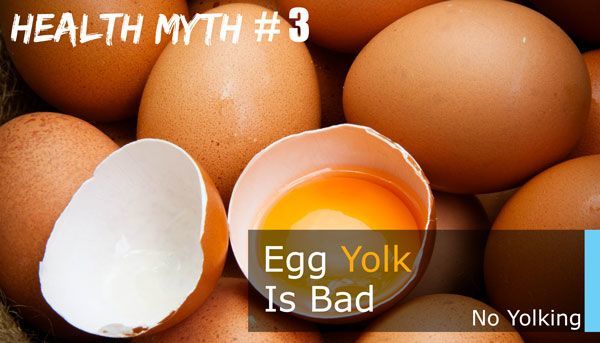
Myth #3: Egg Yolks Should Be Avoided Because Their High In Cholesterol
Eggs are one of the most complete and healthy foods that anyone could eat. Avoiding egg yolks because they are high in cholesterol is one of the most outrageous health myths that people still subscribe to. By throwing away the yolk, you are throwing away the vast majority of the eggs nutritional benefits.
The egg myth revolves around the threat of increased risk of heart disease and stroke. But one review of 17 studies, which included over 260,000 participants, found that eating eggs had no effect on the risk of developing heart disease or having a stroke. It is important to note that this reviews findings were for non-diabetic individuals. [7]
Some studies have found that diabetics who eat eggs may have an increased heart attack risk. [8]
Studies prove that eggs actually raise our “good” cholesterol and do not raise the risk of heart disease. [9]
The Bottom Line: Eggs are one of the most nutritious foods on the planet. By throwing away the yolk you are throwing away the nutritional value. Eating more eggs will actually improve cholesterol levels and provide your body with a plethora of health benefits.
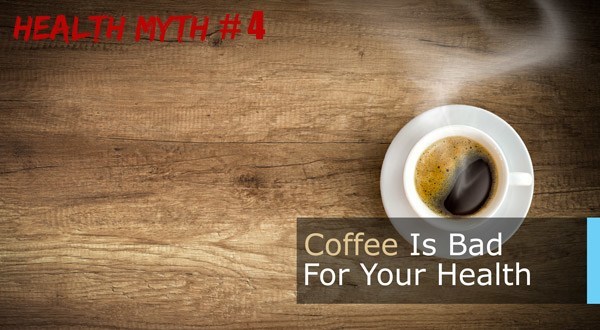
Myth #4: Coffee Is Bad For You
We want to preface this myth. If you are drinking coffee loaded with sugar and whiteners, it is unhealthy. We are discussing the myth the coffee itself is bad for you.
Coffee has many powerful health benefits, it is loaded with antioxidants and tastes delicious! In the typical North American diet, coffee outranks both vegetables and fruits (combined) as a primary source of antioxidants. [10]
Regular coffee drinkers often have a reduced risk of depression, developing type 2 diabetes, Alzheimer’s disease and even live longer than non-coffee drinkers. [11,12,13,14]
The Bottom Line: When consumed in moderation (1-2 cups daily), coffee is quite healthy. Filled with antioxidants that help to fight disease and improve overall health. Keep it black in order to reap these numerous health benefits.
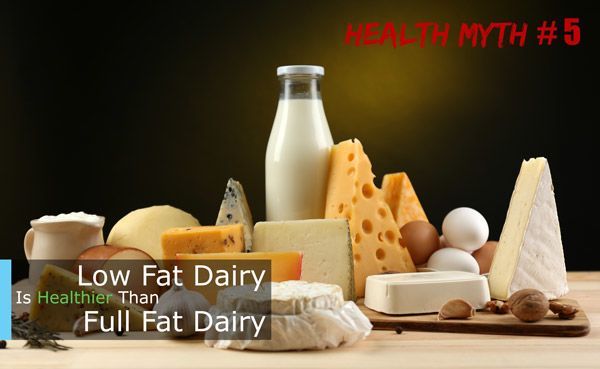
Myth #5: Low Fat Dairy Is Healthier Than Full Fat Dairy
High in saturated fats and calories, full-fat dairy products have been demonized for decades. Instead, it is recommended that you opt for the low-fat dairy alternatives.
The main benefits of dairy products are a result of their fatty content. Choosing low-fat dairy products is therefore an awful idea if health is your concern.
Grass-fed cow, full fat dairy products are associated with a 69% lower risk of heart disease. Proving the information we have been fed regarding full-fat dairy is full of it. Fat found in dairy is not linked to an increased chance of heart disease, and it is actually associated with a lower risk of becoming obese. [15,16,17]
The Bottom Line: Go for full fat dairy products to achieve the maximum health benefits. Moderation is still key though, pouring butter in your coffee or drinking full-fat cream daily is not recommended.
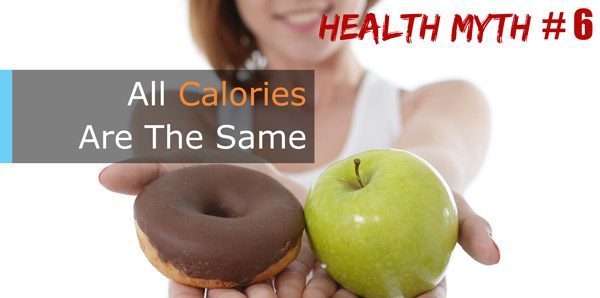
Myth #6: A Calorie Is A Calorie Is A Calorie
Getting your calories from junk food is the same as getting them from healthy proteins or vegetables, after all, a calorie is a calorie.
Counting your calories, and only your calories is a terrible idea for both weight loss efforts and overall health.
Different foods are processed differently, going through different metabolic pathways and affecting hunger, hormones and health differently.
Getting your calories from protein for example is quite different than getting them from carbohydrates. A high protein diet has been found to increase the metabolic rate by as much as 100 calories per day. It has also been found to significantly reduce appetite, leading to reduced calorie intake and increased calories burned. [18,19]
The Bottom Line: Calories are not all created equal. They all have different effects on our overall hunger throughout the day, hormone balance and general health.
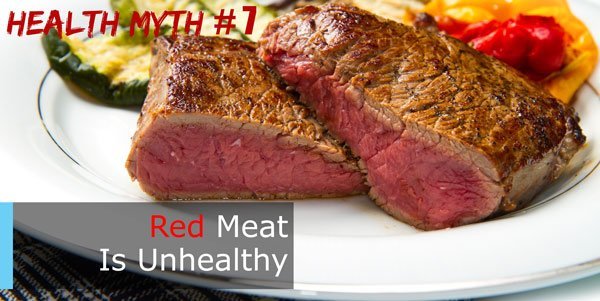
Myth #7: Red Meat Is Unhealthy And Leads To Heart Disease
Red meat is delicious, but it leads to all sorts of health problems, including cancer, heart disease, type 2 diabetes and more.
Sure, some studies have shown that red meat can be harmful to our health, and it can. However these studies looked at processed meats, which are notoriously unhealthy, we have no issue with that. Our issue is with the unprocessed red meats getting a bad rap because of these studies.
Studies done on unprocessed red meats prove that it is not linked to heart disease or diabetes. The link to red meat and cancer is also virtually non-existent. [20,21]
The one health concern with both processed and unprocessed red meats occurs when it is cooked too well. This causes charring of the meat and significantly increases the level of toxins found in the meat.
The Bottom Line: Source grass-fed, unprocessed red meat and don’t overcook it. This will provide a myriad of nutrients and healthy protein for your body. Unprocessed red meats will not increase your risk of heart disease when eaten in moderation.
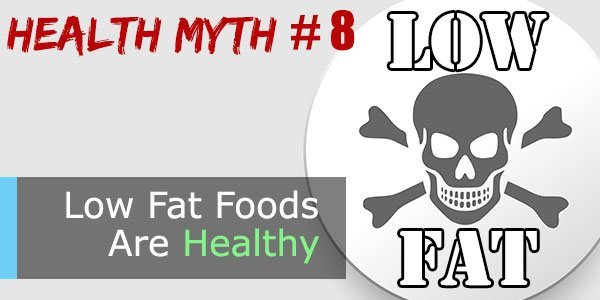
Myth #8: Low Fat Foods Are Healthier
Choosing “Low-Fat” options is obviously the healthiest choice, because fat is evil… right?
Fat became the enemy and the food-producers responded by slashing the fat content of their foods dramatically. This resulted in healthy looking options, but they tasted awful! So these food producers responded by loading them with sugar and artificial flavors.
These new-found low-fat foods were lower in calories and had reduced saturated fat. The excess sugar and chemicals used to make these foods palatable made them far worse for our health than the full-fat alternatives.
The Bottom Line: Sure the nutritional label might look more appealing on low-fat foods, but the fact remains, they are far less healthy (and tasty) than the full-fat alternatives. When you see “low-fat” or “reduced fat” on the label, turn and run!
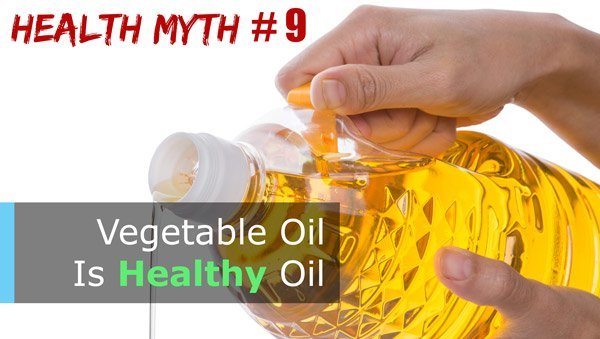
Myth #9: Vegetable Oils Are Healthy
Canola oil, soybean oil and corn oil are just a few of the vegetable oils that are high in Omega-6 fats, which are associated with lower cholesterol levels.
However, these very same vegetable oils have been associated with an increased risk of death via heart disease and cancer. [22,23]
While Omega-6 fatty acids are important for our health, the average North American diet gets plenty of these fatty acids. While most diets get a dangerously low amount of Omega-3 fats, which are extremely important to our health. Having a balance between Omega-6 and Omega-3 fats is the key.
Mainstream media has been glamorizing vegetable oil for years, claiming it has numerous benefits over other fats, to this day many health professionals still recommend it. It really makes you wonder, how much proof is necessary in order to change the way we think about highly processed, unhealthy vegetable oil.
The Bottom Line: Avoid vegetable oil at all costs. It may claim to lower cholesterol, but it will increase your risk of death… Instead opt for a cold-processed, extra virgin olive oil or grass-fed butter.

